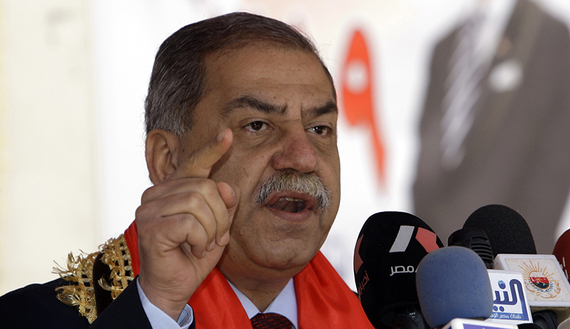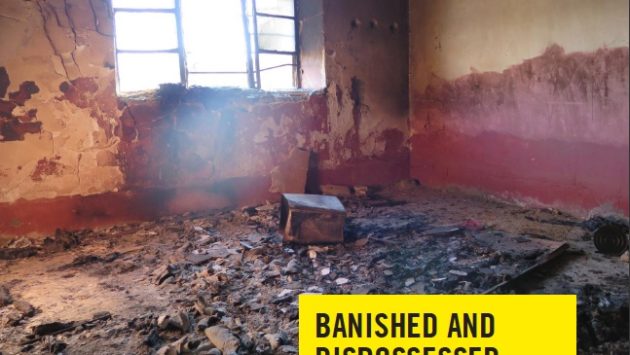Iraqi Secularists Under Attack Ahead of Elections!
Ali Mamouri – AlMonitor

Kadhem al-Haeri, a cleric who has close ties with the Islamic Dawa Party and the Iranian regime, issued a fatwa March 30 banning the election of secular candidates in the upcoming elections. Large banners were hung in many areas of Baghdad and included a picture of the marja (spiritual guide) and the signature of the party’s office. The banners read: “It is forbidden to elect secular candidates.” The banners, hung late in March, are still present in some areas in Baghdad.
This fatwa has come in tandem with a media attack by ruling Islamic parties against the secular movement. The official media outlets of these parties are constantly instilling fear among the people regarding the “dangerous agendas” of secular candidates, claiming they have links to foreign parties and ties with the former regime.
A good example of this drive is what recently happened to civil activist Hanaa Edwar, known as the “Mother Theresa of Iraq” for the large-scale humanitarian services she provides there. Almasalah, affiliated with Prime Minister Nouri al-Maliki, accused Edwar of raising the old Iraqi flag from the era of deposed President Saddam Hussein and of being involved in corruption cases, without presenting any documents or supporting evidence. The website also described her critical stance against Maliki and the Iraqi government’s violations of human rights during a conference held by Maliki himself in 2012 as “exhibitionist, theatrical and characterized with overreaction and self-inflation.”
Another example is the use of propaganda against a prominent candidate of the secular movement in the current election, Mithal al-Alusi. Darbonh, affiliated with the State of Law Coalition, accused Alusi of being Baathist and having close ties with Zionists and Western security agencies. Alusi had been excluded from this election by the Iraqi High Electoral Commission, only to be accepted later by the Supreme Court. It is worth mentioning that Alusi lost his two sons in 2005, when they were killed by a terrorist militia after he visited Israel. He was also ejected from the Iraqi parliament by Islamic parties, although he was officially elected.
Many threats have been leveled by extremist groups against prominent figures in the civil movement. Among those threatened are Fatima al-Bahadli, a feminist activist from Basra, and Saad Salloum, an academic and journalist. The latter brought his human rights and minority rights activism to a halt after he was threatened through letters, phone calls and messages on social media.
These tactics are common ways to exert pressure on the secular sphere in Iraq. Smear campaigns in the media and threats of violence are used together to undermine the political participation of secular candidates. Many figures belonging to the secular movement have been killed with the perpetrators never being discovered, no governmental probe carried out nor any conviction issued.
The main reason for targeting secular individuals is extremist religious parties’ belief that their electoral interests depend on keeping secular candidates out, as they have contradictory principles and goals of governance. This common interest brings together divergent extremist religious parties against secularists.
Misleading stereotypes about secularism pave the way in Iraq for religious parties. Secularism is depicted as going against religion and threatening to ban the religious freedoms Shiites acquired after the fall of Hussein. Many also believe that since the old regime was secularist, any call for secularism means a return to the previous era — even though the idea that the previous regime was secular is totally wrong.
It is striking that extremist Sunni and Shiite religious movements, regardless of their differences and religious conflicts, are united over opposing secularists, which results in the latter being threatened by terrorist groups, militias and even the government itself. While the government disregards the sectarian statements of some of its members, it issued arrest warrants against secularists for criticizing the government’s underachievement and inclination toward sectarian approaches.
The use of religious fatwas is a dangerous and unprecedented development in these elections. Haeri, who issued the aforementioned fatwa, is one of the more extremist clerics in Iran. He previously issued a fatwa to allure Shiite mujahedeen into going to Syria to fight and is seen as one of the main supporters of Shiite militias.
It is also important to mention that the trend opposing secularists is not supported by Shiite Supreme Guide Ali al-Husseini al-Sistani. Until this time, he has not criticized or adopted any stance against secularists. On the contrary, he was critical of the imposition of religious vision on society, and has called for equal opportunities for everyone in terms of political participation.
The resorting to fatwas, coinciding with smear campaigns in the media and threats of violence, shows the fear on the part of extremist religious parties that the Iraqi people will change their orientations in the upcoming elections to their detriment, especially as signs foretell of moderate religious parties getting closer to secular parties.


